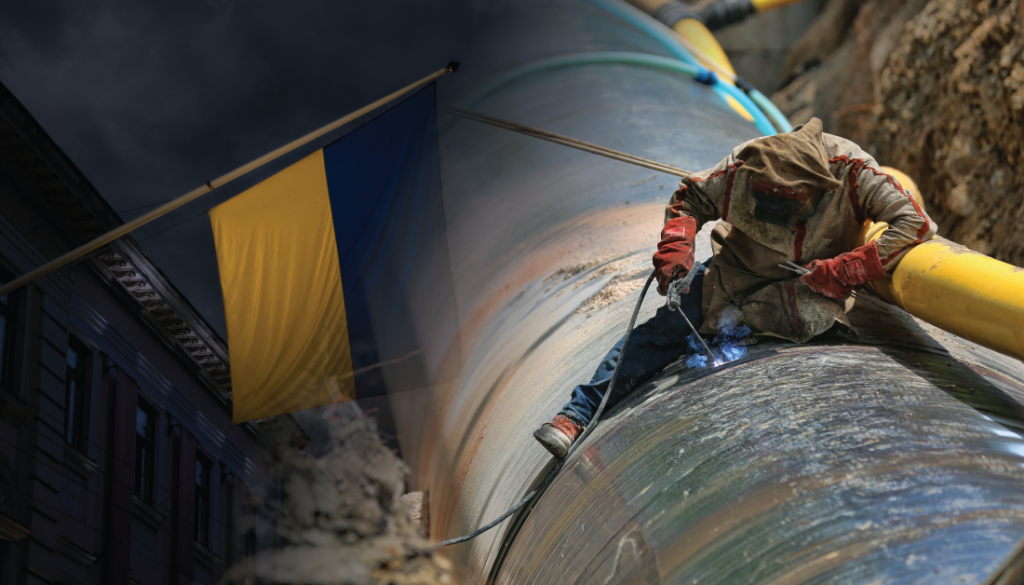How Does the War in the Ukraine Affect Proposed Pipeline Projects in Canada and the US?

Posted by on July 20, 2022 in Blog.
When it comes to oil and energy, it’s important to understand that everything is connected globally. Currently, the war between Russia and Ukraine is devastating as well as causing fossil fuel prices to surge around the world, especially in places such as the US and Canada. So, what does that mean exactly?
Well, Russia accounts for about 10% of global petroleum production. As the war with Ukraine continues, countries like the US and Canada are wanting to pull away from Russia as a source of fossil fuels. Specifically, there have been sanctions put in place to halt the production of the Nord Stream 2 pipeline that would connect Germany and Russia. This could mean big things for pipeline projects in those countries, as well as other areas around the world. Let’s look at what’s going on with the pipelines.
What is the Nord Stream 2?
To start, it’s important to understand what the Nord Stream 2 (NS2) pipeline is. The NS2 is a 1200km pipeline that was built under the Baltic Sea. It would move gas from the Russian coast near St. Petersburg to Lubmin Germany. The problem here is that all things oil and pipeline are political topics. If Germany and Russia were to go through with the pipeline, it could strain relationships with other countries such as the US and Canada.
The NS2 is not currently operating because Germany has put the license on hold. Not to mention President Joe Biden made a statement that he had been working with Germany and agreed on stopping the NS2 if Russia continues to invade Ukraine.
When it comes to the issue of the NS2, other world leaders view the issue as being that if it was allowed to operate, Russia would have more control over Europe. The entire planet heavily relies on fossil fuels, and Russia is a huge source. In 2006, Russia shut off the gas supply to Ukraine due to financial issues, and there is a fear they’ll do it again.
So, as of right now, there are sanctions on the continuation of the NS2 pipeline. There are opposing sides when it comes to the issue. Some think that the NS2 could be a good resolution and open up negotiations between Russia and Germany. The sanctions that are in place due to the war in Ukraine are also continuing to damage the relationship between the US and Russia. With this great divide, what’s going to happen with pipelines around the rest of the world?
Pipelines and the Oil Industry in Canada
For those in Canada, there is no immediate threat to energy sources, but there could be down the line. It might be a good idea for Canada to get the ball rolling on fossil fuel pipelines to become self-sufficient and less reliant on Russia. As natural gas prices rise during this geopolitical problem, the issue is going to need to be fixed.
Canada is trying to reduce their greenhouse gas emissions by at least 40% by 2030 and reach net-zero emissions by 2050. So, Canada will need to be careful with what they choose to do as far as fossil fuels go. If things continue the way they are with Russia and Ukraine, pressure may be put on Canada to expand as a global source of fossil fuels.
Canada has the third-largest proven oil reserve in the world, and it’s mainly located in the western oilsands. That means that Canada has one of the largest sources of oil that can currently be recovered and used. The reserves are around 171 billion barrels of oil. That’s about 10% of the world’s reserves, which is more than Russia. So, it would make sense that Canada would be on the radar as another global source of petroleum products.
With that being said, as technology gets better Canada could be an even better source of oil, as well. If gas and oil prices continue to surge because of the war in Ukraine, it could increase public interest in Canada’s energy resources.
Current Pipelines in Canada
Just as they are in Europe, pipelines are a crucial part of the fossil fuel industry in Canada. They are the safest and most efficient way to move large volumes of oil from place to place. The majority of the gas coming from these pipelines only goes to the US. If Canada were to become a global source of oil, it would need to expand pipeline projects to accommodate that.
There has been opposition against new pipelines from US President Joe Biden and other pushback due to environmental challenges. There is a need for the two leaders to come to an agreement so that Canada can expand and continue with pipeline projects.
Conclusion
The war in Ukraine is very devastating to watch from afar, and the world is hopeful that Russia will pull back its efforts. It is also important to understand that this war is affecting the entire world due to international sanctions on oil distribution.
This war could potentially mean a huge shift in where the main sources of oil come from in the world. While Canada has the third-highest oil reserves and world class practice and policy, astonishingly enough, has not been looked at as a top global supplier.
If things continue the way they are with the war, countries such as the US and Canada are going to have to find other ways to access fossil fuels. Becoming self-sufficient would mean less reliance on places like Russia and could help resolve issues such as current rising oil and gas prices
